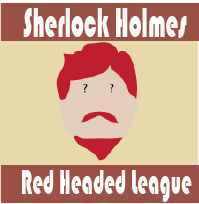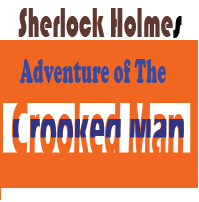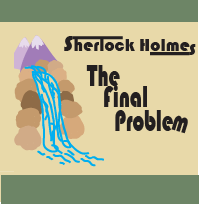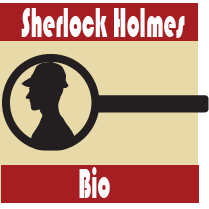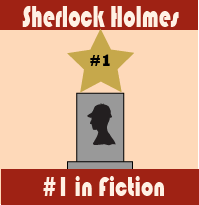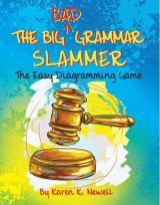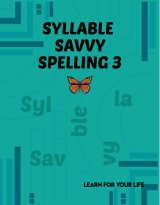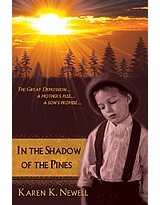Final Problem Analysis
One of the best known and most dramatic Sherlock Holmes stories is The Final Problem. Our analysis demonstrates not only a dramatic action plot, but unparalleled use of figures of speech and one of the most successful failures in literary history!

- Quotes About Moriarty
- About Mycroft Holmes
- Background Information
- Analysis of the Storyline
- Death of Sherlock Holmes?
Quotes About Professor Moriarty

Repetition
Note the use of repetition for emphasis:“I tell you Watson, in all seriousness, that if I could beat that man, if I could free society of him, I should feel that my own career had reached its summit, and I should be prepared to turn to some placid line in life. Between ourselves, the recent cases in which I have been of assistance to the royal family of Scandinavia, and to the French Republic, have left me in such a position that I could continue to live in the quiet fashion which is most congenial to me, and to concentrate my attention upon my chemical researches. But I could not rest, Watson, I could not sit quiet in my chair, if I thought that such a man as Professor Moriarty were walking the streets of London unchallenged.”
Praise for the Enemy
Sherlock offers considerable praise to his enemy, and Doyle offers parallelism in writing.He is a genius, a philosopher, an abstract thinker.
His career has been an extraordinary one. He is a man of good birth and excellent education, endowed by nature with a phenomenal mathematical faculty...But the man had hereditary tendencies of the most diabolical kind. A criminal strain ran in his blood, which, instead of being modified, was increased and rendered indefinitely more dangerous by his extraordinary mental powers.
For years past I have continually been conscious of some power behind the malefactor, some deep organizing power which forever stands in the way of the law, and throws its shield over the wrong-doer.
Metaphor
He is the Napolean of crime, Watson. He is the organizer of half that is evil and of nearly all that is undetected in this great city.
Simile
He sits motionless, like a spider in the centre of its web, but that web has a thousand radiations, and he knows well every quiver of each of them.
Juxtaposition
The ultimate contrast: polar opposites of each other are Sherlock and Moriarty:“I think I may go so far as to say, Watson, that I have not lived wholly in vain. If my record were closed to-night I could still survey it with equanimity. The air of London is the sweeter for my presence. In over a thousand cases, I am not aware that I have ever used my powers upon the wrong side. Of late I have been tempted to look into the problems furnished by nature rather than those more superficial ones for which our artificial society is responsible. Your memoirs will draw to an end, Watson, upon the day that I crown my career by the capture or extinction of the most dangerous and capable criminal in Europe.”One more thing about that last quote. Of the different features we have learned about in Sherlock stories, that last sentence might be A Pre-Introduction Prophecy - a unique feature of the Sherlockian tales.
Consonance Par Excellence
Here’s another quote from a different story, “The Adventure of the Illustrious Client.” It’s revealing enough we thought we could include it here. Read it out loud for its best effect, and note the consonance of the "s" sound. You can almost hear the cobra hissing. You will also find simile and metaphor aplenty:"He is an excellent antagonist, cold as ice, silky voiced, and soothing as one of your fashionable consultants, and poisonous as a cobra. He has breeding in him - a real aristocrat of crime - with a superficial suggestion of afternoon tea and all the cruelty of the grave behind it.”
Contradiction
Did Doyle intend this contradiction here? See if you can pick up a contradictory effect in these three statements:- He only plans. But his agents are numerous and splendidly organized.
- But the professor was fenced round with safeguards so cunningly devised that, do what I would, it seemed impossible to evidence which would convict in a court of law.
- At the end of three months I was forcd to confess that I had at last met an antagonist who was my intellectual equal.
Holmes is really, really up against something big here.
Rhthym
Read this quote and note the rhythm in the words as well as the meaning. One can almost hear the trip and the weaving in the words:But at last he made a trip - only a little, little trip - but it was more than he could afford, when I was so close upon him. I had my chance, and starting from that point, I have woven my net round him until now it is all ready to close.
Just A Little Pressure - Maybe
So.....imagine you are Watson. Sherlock hasn’t been around for a while. You are busy with your own life and medical practice. And then - THIS!On Monday next - matters will be ripe, and the professor, with all the principal members of his gang, will be in the hands of the police. Then will come the greatest criminal trial of the century, the clearing up of over forty mysteries, and the rope for all of them; but if we move at all prematurely, you understand, they may slip out of our hands at the last moment.If you were Watson, your reaction might be:
- Ummm, what do you mean OUR hands? I didn’t have anything to do with this?
- Well, rather than move prematurely, as you say, why don’t we mind our own business and let the police handle it?
- They are all getting the ROPE! Sounds like murderers. Maybe we are a bit over our heads.
- Sure, count me in! Always game for one of your adventures!
- Why don’t you ask one of the Baker Street boys? I’m sure they would help you.
Of course, that wasn’t much of a question. We all knew what the real Watson would do.
Metaphorical Figure of Speech
Their action/reaction is compared to sword play:I tell you my friend, that if a detailed account of that silent contest could be written, it would take its place as the most brilliant bit of thrust-and-parry work in the history of detection.
Polyptoton
Polyptoton is a stylistic use of the same root word with different endings.He cut deep, and yet I just undercut him.
Physical Description
If you were the producer of a film and looking for a character to play Moriarty, would you have a hard time finding an actor that matches this:He is extremely tall and thin, his forehead domes out in a white curve, and his two eyes are deeply sunken in his head. He is cleanshaven, pale, and ascetic-looking, retaining something of the professor in his features. His shoulders are rounded from much study, and his face protrudes forward and is forever slowly oscillating from side to side in a curiously reptillian fashion.
Circumlocution
In this next statement Moriarty uses “circumlocution”. Circumlocution is “talking around” a subject by intentionally being vague and NOT saying exactly what is meant.You have worked things in such a fashion that we have only one resource left. It has been an intellectual treat to me to see the way in which you have grappled with this affair, and I say, unaffectedly, that it would be a grief to me to be forced to take any extreme measure.Translation: "My only recourse is to kill you. I've had so much fun in this battle between us I'm hoping I don't need to. But if I do, oh well."
Antithesis
This statement below is a form of antithesis: or opposites in parallel form.My horror at his crimes was lost in my admiration at his skill.
- crimes vs skill
- Reichenbach Falls by World of Waterfalls
- Reichenbachfalle by Catching Film
- horror vs admiration
Contrast
Note the double contrast here:You hope to place me in the dock. I tell you that I will never stand in the dock.Here Moriarty is contrasting “you hope” with "I tell you." He is indicating his belief in his superiority in strength compared to Sherlock's ability.
You hope to beat me. I tell you that you will never beat me.
Mycroft Holmes
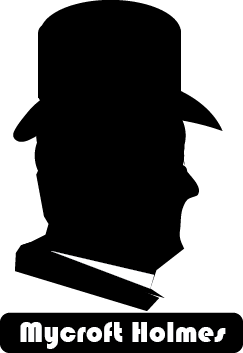
So in the middle of listing the attacks against him, Sherlock mentions he took refuge in his brother’s rooms in Pall Mall - a section in London. Sherlock has a brother?
Of the 60 Sherlockian stories in the canon, only four mention the brother, whose name is Mycroft. The first time he is mentioned is in the 24th story “The Adventure of the Greek Interpreter.” This story is the only second time he is mentioned. More information can be found about him at this curious character at Quotes about Mycroft Holmes.
Background Information
Coup-de-maitre
As they watched the specially chartered train pass them on the first stop, Sherlock stated:It would have been a coup-de-maitre had he deduced what I would deduce and acted accordingly.So, for those of you who don't speak French, a coup-de-maitre is a master stroke.
Alpine Stock
This is a walking stick, a handy object even for the young and vigorous on a mountain path. When Watson saw the Alpine Stock with Holmes nowhere in sight he felt afraid. The fact that it is mentioned three times indicates it is significant as a symbol. But a symbol of what? In this case, it indicates Holme's absence and causes an immediate fearful response from Watson.Analysis of the Story Line
Pre-Introduction Pronouncements
We have described one of Doyle's Sherlockian features of Pre-Introduction Pronouncements which can be statements made by Sherlock or reasons given by Watson for writing a case. In that first, long paragraph at the beginning of this story, Watson had written that Moriarty’s brother had made false statements about Moriarty and Holmes - which was Watson’s reason for writing the details of the case. He had finished that first paragraph with the words:It lies with me to tell for the first time what really took place between Professor Moriarty and Mr. Sherlock Holmes.
He ends the final paragraph with the declaration:
...if I have now been compelled to make a clear statement of his (Moriarty’s) career, it is due to those injudicious champions who have endeavored to clear his memory by attacks upon him whom I shall ever regard as the best and the wisest man whom I have ever known.
Crimes? What crimes?
Perhaps you caught onto something a bit vague. Holmes clearly identifies Moriarty as the ring leader of over forty crimes. We really don’t learn exactly WHAT Moriarty and Company have done. Why didn’t Doyle specify the types of crimes he was responsible for?Lots of film makers have had fun creating their own versions of Moriarty and his criminal network by filling in the details Doyle left out. If YOU were going to make a Sherlock film, what kind of criminal enterprise would you create for this band of bad guys?
So why didn’t Doyle describe the crimes of the criminal? The real technique here is this: Doyle used Moriarty to get rid of a character he was tired of. Some might call it a cheap shot. Some might call it a brilliant move. Let's delve further.
The Death of Sherlock Holmes
Reichenbach Falls
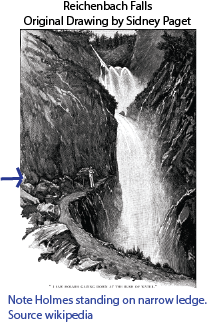
It is, indeed, a fearful place. The torrent, swollen by the melting snow, plunges into a tremendous abyss, from which the spray rolls up like the smoke from a burning house. The shaft into which the river hurls itself is an immense chasm, lined by glistening coal-black rock, and narrowing into a creaming, boiling pit of incalculable depth, which brims over and shoots the stream onward over its jagged lip. The long sweep of green water roaring forever down, and the thick flickering curtain of spray hissing forever upward, turn a man giddy with their constant whirl and clamour.This actual location is indeed a memorable place for the climax of this story, and in fact one of the most dramatic scenes of the entire Sherlock canon. You might like to look up a few short internet videos which were available at the time of this publication to see it:
The waterfalls, which are a geologic point-of-interest in their own right, have become a tourist attraction as the most famous scene in detective literature. I have wondered what made Doyle chose this location. Had he visited it and it seemed like a perfect location for such a climactic ending?
Juxtaposition in Death
The contrast between Holmes and Moriarty is continued in the last paragraph:...and there, deep down in that dreadul cauldron of swirling water and seething foam, will lie for all time the most dangerous criminal and the foremost champion of the law of their generation.
Doyle's Reason for Killing Holmes
So what was up with Doyle anyway? What author kills off the hero at the height of popularity?Doyle did some more serious writing than his Sherlock Holmes stories. He wanted to give more attention to his historical writing and less time to the popular series.
Reactions to His Death
What was your reaction to Holme’s death? What do you think the contemporary fans thought when they read these words?It was the last I was ever destined to see of him in this world.
They weren’t too happy, actually. It is said that people wore black arm bands to show their grief. The Strand magazine, which published the stories monthly, lost 20,000 subscriptions from readers who had no other reason to get the publication. Just a little pressure, right?
The public won. The author was forced to bring his dead hero back to life. But how? When? The Final Problem was published in December 1893. Forced to wait ten years, fans were exuberant when The Adventure of the Empty House explained how Holmes had deceived even his closest companion in faking his death. (For historical accuracy - a novellette, Hound of Baskervilles, published in 1891 did let the fans more Sherlock tales would be coming. But they had to wait to find out how this miracle could occur.)
It has often seemed to me just a bit coincidental that Doyle killed off Holmes in a fashion that did not leave a body behind. That allowed him to resurrect Sherlock later - albeit ten years later. Do you think maybe - just maybe - Doyle intended to leave himself some wiggle room to bring back his annoying character if he should so choose to do in the future? (Thought: Sherlock may have diminished the significance of Doyle's more serious writing, but it never diminished Doyle's bank account.)
Holme's Success?
Let’s imagine (as the first readers were forced to do) that Holmes was not brought back, that he really had died in the Reichenbach Falls. Would you say Holmes was successful in this case?The fact that he died wouldn't mean failure. Holmes himself said several times (see quotes above) he would consider himself successful if he eliminated Moriarty. This case can be added to the majority of his cases: a success.
Doyle's Success
Ok, you know Sherlock survived (but you don’t know how!) What long term impact did that have on the series? Obvously more stories meant more sales. But from a literary perspective, what effect did it have? The Final Problem marks the half-way spot of the Sherlock tales. As we stand on the ledge of Reichenbach Falls, there are 28 short stories and 2 novelettes behind us. It just so happened there were 28 short stories and 2 novelettes to come.Many fans, while thrilled to have their hero return, found that the stories weren’t as satisfying. Holmes wasn’t as quirky, he didn’t have as many faults. While half of the stories were pre-Reichenbach and half were post-Reichenbach, the pre-Reichenbach stories are published and read in greater number. Do you think (gasp!) Doyle maybe should have LEFT Sherlock at the bottom of the chasm?
But while the post-Reichenbach stories may not have as great of a circulation, the drama on the cliff continues. Film-makers love Moriarty. Reichenbach makes such a dramatic scene! And Holme’s ability to survive the unsurvivable added to his legend. Maybe it wasn’t such a bad idea to throw him over the cliff!
Buy Sherlock Holmes: The Unit Study
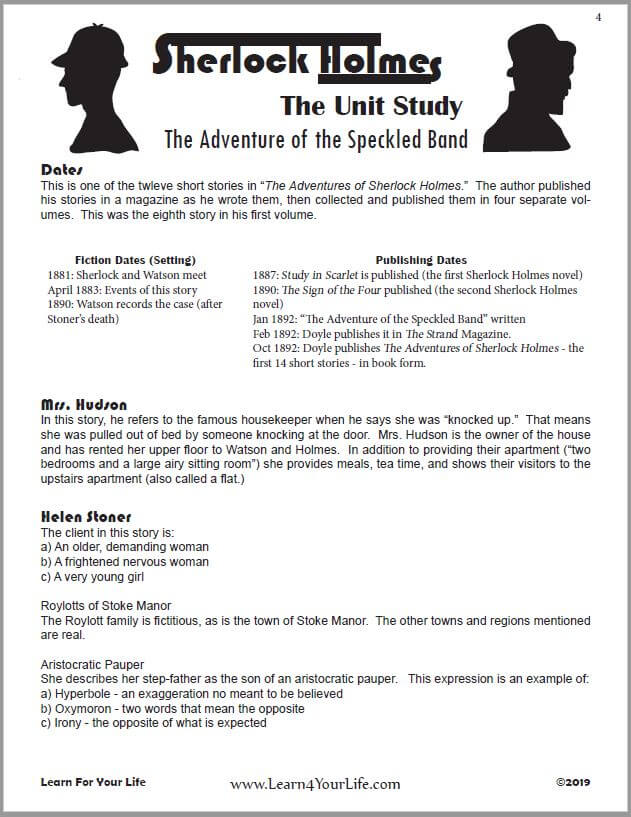
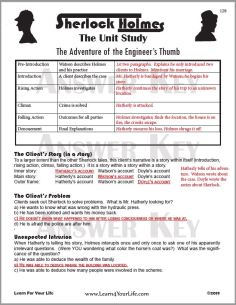
Student Guide AND Teacher's Answer Key Included
$2.99 Download - 183 pages
Eight of the most popular tales demonstrate how to investigate a detective story.
![]()
Sherlock Holmes Pages
A catalog of our pages on Sherlock Holmes.


About Our Site
Hands-On Learning





